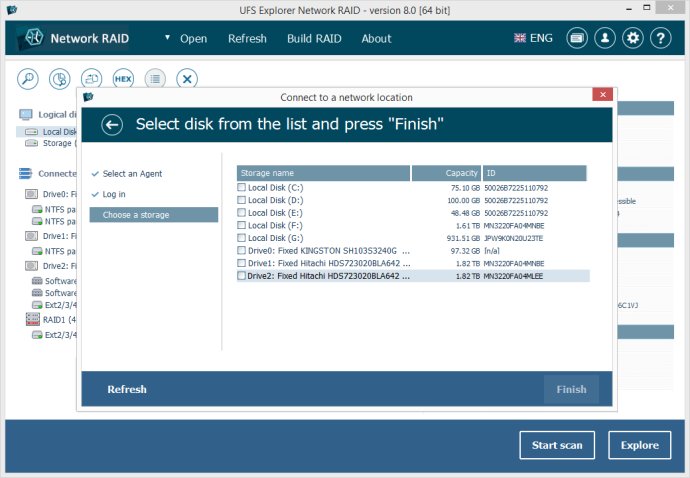UFS Explorer Network RAID is a robust data recovery software designed for standard and RAID operations. It effectively retrieves data from network-connected media attached to remote computers.

One standout feature of this software is its ability to easily restore files from any remote storage device, regardless of the operating system it is running. Moreover, assembling a RAID from drives connected to multiple PCs is a breeze with the user-friendly interface of UFS Explorer Network RAID. The program supports a wide range of RAID configurations, ranging from standard patterns to nested/hybrid levels and custom setups. Notably, it features a flexible RAID builder with an embedded script handler, simplifying the process of defining and modifying even the most complex RAID configurations.
Advanced users will appreciate the inclusion of a hexadecimal viewer, which allows for in-depth analysis of raw data from partitions and drives. Additionally, the software is compatible with an extensive array of storage devices, including PCs, laptops, USB flash drives, memory cards, external hard drives, and virtual disks of popular virtualization platforms. To further demonstrate its versatility, UFS Explorer Network RAID seamlessly supports various file systems such as Windows, macOS, Linux, BSD/Solaris, as well as modern storage technologies like mdadm and LVM, Windows dynamic disks and MS Storage Spaces, Apple Software RAID and Fusion Drive, Drobo BeyondRAID, Synology Hybrid RAID, and Btrfs-RAID. It also encompasses encryption methods like BitLocker and APFS.
In terms of functionality, UFS Explorer Network RAID offers direct LAN access, ensuring convenient data recovery and the ability to recover data from drives with bad sectors connected via a DeepSpar Disk Imager device. Additionally, the software provides numerous options for handling damaged drives. Users can configure parameters for accessing and using a storage device, create disk images with customizable settings and rules for processing bad blocks, and manage drives and arrays with bad blocks using generated maps or third-party tools.
Overall, UFS Explorer Network RAID is a comprehensive solution for recovering lost or damaged data on your network. Its compatibility with various file systems and modern storage technologies is highly impressive, making it an invaluable tool for both tech-savvy professionals and regular users. If you are seeking a sophisticated and reliable data recovery software that is easy to use, look no further than UFS Explorer Network RAID.
Version 10.5:
Added ZFS pool builder GUI:
- Added GUI to view/edit ZFS pool configuration, including Vdevs, RAID-Z level and members etc.;
- Possibility to assign components manually (after metadata damage) and force placeholders on place of missing components;
- Added 'New ZFS pool' function under 'RAID' ...
Version 10.3:
Reworked 'Save with filter' GUI: different filters separated to 'tabs', target path was made editable;
Added indication of ZFS pool component properties (vdev, RAID configuration, RAID-Z member, pool ID etc.);
New filter UI design is also applied to reporting function
Version 10.2:
* 'Open device (advanced)' function now has setting for maximum IO block size (to support limitations of some adaptors);
* In disk imager (ATA mode) - fixed issues with read errors caused by mis-aligned buffer;
* SDLSP format now has native support of extended sector sizes (such as 520, 528, 4160
Version 10.0:
* Added 'media manager' function:
- Optional detection of supported connected 'complicated' media devices (dedicated UI section for recognized media devices);
- Automatic assembly of mdadm RAID and LVM;
- Assisted (automatic) access to shared folders, iSCSI volumes, snapshots etc.;
...
Version 9.18:
* Saving disk image files to E01 (EWF) format...
* HFS+ scan: better reconstruction of lost folder names from journal;
* ExFAT scan: removed duplicate 'green'/'yellow' file systems in result.
Version 9.17:
* Saving disk image files to E01 (EWF) format...
* HFS+ scan: better reconstruction of lost folder names from journal;
* ExFAT scan: removed duplicate 'green'/'yellow' file systems in result.
Version 9.15:
* Saving disk image files to E01 (EWF) format...
* HFS+ scan: better reconstruction of lost folder names from journal;
* ExFAT scan: removed duplicate 'green'/'yellow' file systems in result.
Version 9.14:
* Saving disk image files to E01 (EWF) format...
* HFS+ scan: better reconstruction of lost folder names from journal;
* ExFAT scan: removed duplicate 'green'/'yellow' file systems in result.
Version 9.13:
Microsoft Storage Spaces:
- Added support of 'type 6' virtual disk descriptor records;
- Fixed issue with support of 'type chunk' records (format version 3 and above);
Fixed issue with resumption of 'scan status' (ssdb) of RAID-Z scan;
Added settings for handling map-defined virtual defects;...